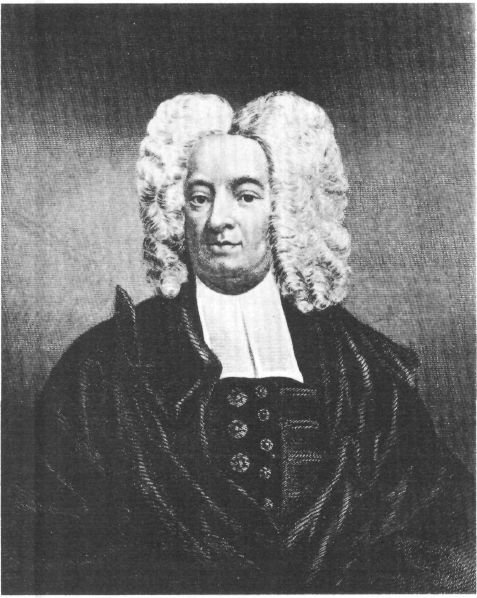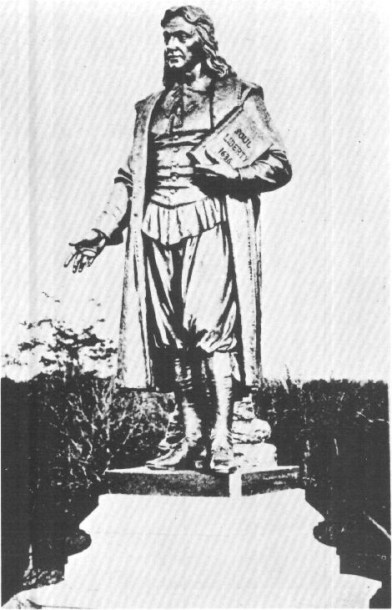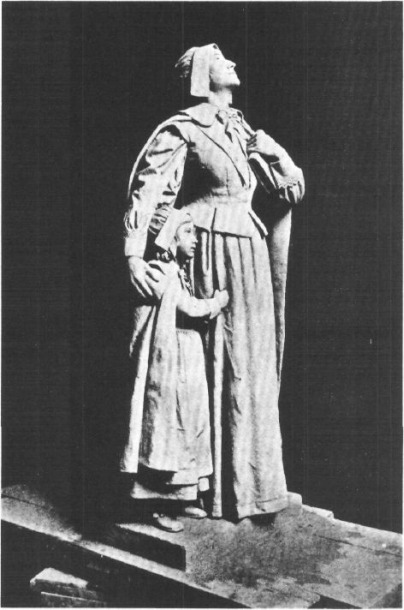Conceived in Liberty (35 page)
Read Conceived in Liberty Online
Authors: Murray N. Rothbard

Courtesy of The New-York Historical Society, New York City
John Winthrop

Courtesy of The New-York Historical Society, New York City
Increase Mather

Courtesy of The New-York Historical Society, New York City
Edmund Andros
(Engraved by E. G. Wilhams & Bros., New York)

Courtesy of The New-York Historical Society, New York City
Governor Berkeley and the Insurgents (Bacon’s Rebellion, 1676)

Cotton Mather

Courtesy of The New-York Historical Society, New Yurk City
William Penn
(Engraved by J. Posselwhite)

Statue of Roger Williams in Providence, Rhode Island

Statue of Anne Hutchinson
I do cast you out and in the name of Christ, I do deliver you up to Satan, that you may learn no more to blaspheme, to seduce and to lie, and I do account you from this time forth to be a heathen and a Publican... therefore I command you in the name of Christ Jesus and of His Church as a Leper to withdraw yourself out of the Congregation....
The undaunted Anne Hutchinson had the last word: “Better to be cast out of the Church than to deny Christ.”
While Anne was undergoing imprisonment and subsequent excommunication, the leaders of the Hutchinsonian movement gathered together to flee the colony, and to prepare a home for themselves and Anne away from the developing reign of terror in Massachusetts. On March 7, 1638, nineteen men, including Anne’s husband, William Hutchinson, gathered at the home of the eminent Boston merchant William Coddington, one of the wealthiest men in the colony and its former treasurer. In a solemn compact, the nineteen formed themselves into a “Bodie Politick,” choosing Coddington as their judge.
The Hutchinsonians first intended to go to Long Island or Jersey to make their home, but they were persuaded by Roger Williams to settle in the Rhode Island area. On Williams’ friendly advice, Coddington purchased the island of Aquidneck from the Indians, and founded on the island the settlement of Pocasset (now Portsmouth). Anne, ill and exhausted, joined her husband at Aquidneck in April as soon as her trial was over.
The enormous significance of Roger Williams’ successful flight and settlement of Providence two years before was now becoming evident. For Williams’ example held out a beacon light of liberty to all the free spirits caught in the vast prisonhouse that was Massachusetts Bay. By the happy accident of the demise of the Council for New England, the land south of Massachusetts Bay and west of Plymouth was free land, free of proprietary and effective royal government alike. It was a haven for religious liberty and for diverse sects and groupings, and for an extension of the logic of liberty as well; for once liberty is pursued and experienced, it is difficult to hobble its uttermost expansion.
When the ill Anne Hutchinson arrived at her haven in Aquidneck, the many months of persecution had left their mark and she suffered a miscarriage, as did her beautiful young follower Mary Dyer, who had stood up to walk out of the Boston church with the excommunicated Anne. The Puritan leaders of Massachusetts Bay, preoccupied for years afterward with the Hutchinsonian menace, characteristically gloated in righteous satisfaction at the misfortunes of Anne and Mary. The theocrats were jubilant and the Rev. John Cotton, Governor Winthrop and the Rev. Thomas Weld all hailed Anne’s and Mary’s sufferings as the evident judgment of God. It was typical of the Puritans to hail the misfortunes of their enemies as God’s judgment, and to dismiss any kindness shown them by others as simply God’s will and therefore requiring no gratitude to those showing it.
Massachusetts Bay continued, indeed, in a state of hysteria over the Hutchinsonian heresy for a number of years. Anne’s followers and sympathizers were fined, whipped, and banished, and five years later Robert Potter was executed for being a Hutchinsonian. It was also typical that, with Anne outside their jurisdiction, the Boston church leaders should send a committee to Aquidneck to try to persuade her of the error of her ways. If they could no longer inflict violence upon Anne, they could at least badger and harass her. It is not surprising that the beleaguered Anne gave the committee short shrift, kicked it out of her home, and denounced the Boston church as a “whore and a strumpet.”
In Pocasset, Anne was spiritual leader of the flock and Coddington temporal leader. The Pocasset government was chosen by the assembled freeholders, and, like Providence, the government had to consent to the arrival of any newcomers to the colony. But Anne Hutchinson was becoming more and more concerned for the principle of freedom of conscience rather than for propagating her own religious views. She began to see that Coddington and his associates were launching a new theocracy of their own in the infant colony. For Coddington was “judge” of the settlement, basing his decrees and decisions on the “word of God,” as interpreted by himself. And Anne began to chafe at the state control that Coddington was increasingly imposing.
Coddington based his seizure of power on the flimsy legalism of his being the sole name on the deed of purchase of Aquidneck from the Indians. Therefore, he claimed for himself all the rights of a feudal lord owning the whole island, owning and renting out the lots of all the settlers, and asserting authority over all land grants.
At the beginning of 1639, Anne Hutchinson led a movement that successfully modified the Pocasset constitution; the change gave the body of freemen a veto over the actions of the governor, and the right to elect three “elders” to share the governor’s powers. Thus, the increasingly dictatorial rule of Coddington was checked.
Coddington reacted most ungraciously to this limitation on his power, and he appointed a constable to keep watch on any “manifest breaches of the law of God that tend to civil disturbance.” Had Anne Hutchinson fled the theocracy of Massachusetts only to see a miniature raise its head in her new home? Finally, in April, the Hutchinson forces insisted, at the Pocasset town meeting, on a new election for governor—a demand that startled Coddington, who expected to remain in office indefinitely and without the fuss and bother of elections. Vigorous pressure by the freemen on Coddington finally won the demand for elections, and William Hutchinson was elected by a large majority. Coddington and his followers, including Nicholas Easton, John Coggeshall, William Dyer, and John Clarke, abandoned Pocasset and founded the new settlement of Newport, at the southern end of Aquidneck Island.
The victorious Hutchinsonians adopted a new compact of government
and changed the name of the town to Portsmouth. Oligarchical distinctions were eliminated, and all the male inhabitants signed the new compact. Provision was made for jury trial, and church and state were at last separated. There was no provision, for example, in the new civil compact about the “word of God,” the only rule by which Coddington had made his decisions. Anne Hutchinson had been rapidly learning firsthand about state persecution, and freedom of religion for all Christians was now guaranteed. William Hutchinson was chosen new chief judge of the colony.